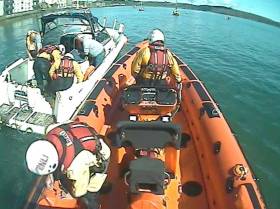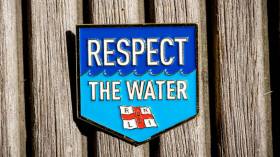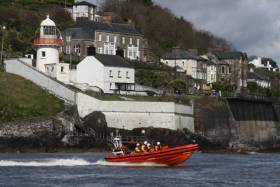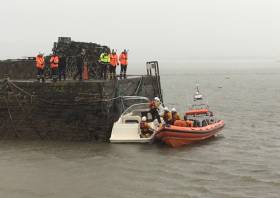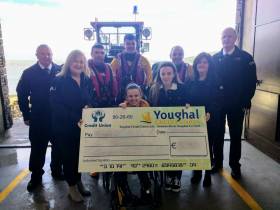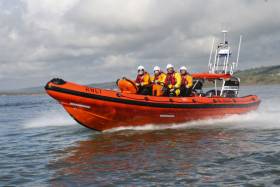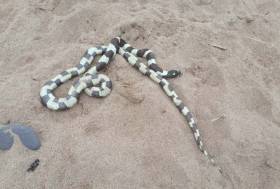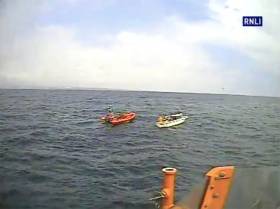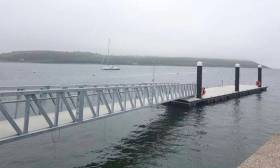Displaying items by tag: youghal
Youghal RNLI launched to the aid of two people whose moored yacht was taking on water yesterday morning (Monday 20 May).
The volunteer lifeboat crew was requested to launch by the Irish Coast Guard at 10.01am following a report that a 26ft leisure craft was taking on water.
hHelmed by Liam Keogh, the inshore lifeboat was on scene within minutes, in clear conditions.
The casualty boat was tied up at its moorings in Youghal Harbour, with the two people onboard trying to pump the water out with a hand pump.
Two lifeboat crew boarded the vessel with a salvage pump and made sure the people onboard were well. They then used the salvage pump to pump the water out.
The lifeboat crew requested the coastguard for quayside assistance and towed the leisure craft safely back to the slip where it was taken ashore on a trailer.
Speaking later, Youghal RNLI helm Liam Keogh said: “This was a smooth callout for the crew and we were delighted to be able to help.”
Youghal RNLI is encouraging people to respect the water and heed key water safety messages ahead of summer.
The East Cork lifeboat station’s community safety team will be running a number of events throughout the summer and are inviting individuals and groups to get in touch if they would like the team to speak to them.
Mick Walsh, Youghal RNLI’s volunteer community safety officer, said while the RNLI wants people to have a fun and enjoyable summer, the charity also wants people to do that with safety in mind.
“Whether you are a swimmer, a watersports enthusiast, an angler, a boater or just enjoy walking on the beach, it is important for you to understand that there are risks involved with all water and water-side activities.
“It doesn’t matter what your activity might be, or how many times you’ve done it, accidents can happen.
“Part of our role is to help educate and share our knowledge with the public. We want to talk to people, to help them understand the risks better and to listen to their experiences.”
Walsh said the RNLI has lots of safety advice on how to respect the water.
“Most people who end up in trouble at the coast didn’t intend being in the water so it’s important to know what do to if you do get into difficulty and end up in cold water.
“The RNLI’s national drowning prevention campaign is called Respect the Water and lots of information can be found on the dedicated site www.RespectTheWater.com, including how to float should you get into difficulty.
“We want people to learn and remember simple messages such as how to call for help. Dial 999 or 112 and ask for the coastguard if you or someone you see is in trouble.
“We can help people choose the best communication device for their activity. We also want people to wear a lifejacket or floatation device when on the water.
“Again we can help you choose the right PFD for your activity. We will also show you how to take care of your PFD properly.”
To get in touch with Youghal RNLI’s community safety team, contact Mick Walsh at [email protected].
You can also keep an eye on Youghal RNLI’s Facebook page for more information detailing the RNLI’s Respect the Water campaign, which launches later this month, and to find out when the community safety team is active.
Youghal’s latest RNLI recruits followed a training exercise on Sunday (31 March) with a callout to a 10ft open boat experiencing engine trouble just off the old Youghal bridge in the East Cork town.
The volunteer crew launched the inshore lifeboat Gordon and Phil within four minutes of returning to station in fresh conditions.
They quickly reached the troubled vessel with two men wearing lifejackets onboard.
A tow line was established and the boat was safely towed back to the ferry slip in Youghal where it was handed over to the owner at 3.40pm, just 10 minutes after launch.
Mark Nolan, deputy kaunching authority at Youghal RNLI, said: “The two people onboard had the good sense to anchor the boat as soon as they started to experience engine trouble.
“They had both a VHF radio and mobile phone with them also and so were able to call for help quickly. It is essential to carry some form of communication with you when you go out on the water.
“We would also like to say well done to all of our shore crew today, all of which were new recruits.”
Recently Youghal RNLI received a cheque for more than €3,000 raised by the Ardmore Christmas Day swim, as previously reported on Afloat.ie.
Youghal’s RNLI volunteers were presented last week with a cheque for €3,439.60 from the organisers of the Ardmore Christmas Day swim.
The event was first organised in 1997 and has successfully run every Christmas Day since. The swim is always well supported by the local community and 2018’s was no exception.
The swimmers met on the beach at Ardmore at 12.15pm on Christmas Day in dry but chilly conditions and made the dash into the water for a quick dip before heading back to the beach for a hot drink.
Youghal RNLI’s inshore lifeboat, Gordon and Phil, and her volunteer crew were there on the day to oversee the safety of the swimmers.
Lifeboat operations manager Derry Walsh said: “We would like to send our thanks to everyone who came out on Christmas Day and took part in the swim, and a special thank you to those who have organised the swim over the last 22 years.
“The RNLI depend on the generosity of the public to save lives at sea, and this donation will help to ensure our lifeboat and crew are always ready when they are called upon.”
Elsewhere, a callout for Larne RNLI to a suspected vessel in trouble on Friday evening (29 March) turned out to be false alarm as smoke seen rising from a vessel at the Maidens was part of a training exercise.
Paul Johnston, Larne RNLI deputy launching authority, said: “We would like to commend the member of the public for contacting the coastguard and raising the alarm. We would always much rather launch to find all is safe and well than not launch at all.”
#Lifeboats - Youghal RNLI’s first callout of 2019 came on Sunday (3 March) while out on a morning training exercise.
The lifeboat crew had been practising casualty recovery in the area of Youghal Harbour when at 11.33am they became aware of a small pleasure craft that had started to take on water.
There was no one on board the pleasure craft the time.
In heavy rain and squally conditions, the inshore lifeboat crew pumped the water from the vessel, then towed it safely back to the pier head in Youghal and handed it over to the awaiting coastguard. The lifeboat returned to the station at 12.07pm.
Youghal RNLI helm Patsy O’Mahoney said: “We went out this morning to practice our skills and ended up having to use them in a real situation.
“The water can be unpredictable at the best of times, but it is particularly dangerous during bad weather. We urge everyone to respect the water at all times.”
Youghal Lifeboat Station Receives Two Generous Donations To Help Save Lives At Sea
#Lifeboats - Youghal RNLI were honoured to receive two generous donations from members of the community in one day recently.
On Saturday 16 February, the East Cork lifeboat station welcomed sisters Aisling and Leanne Hehir who recently celebrated their birthdays, with Aisling turning 18 and Leanne 21.
Instead of gifts, they asked their family and friends to make a donation to Youghal RNLI. In total they raised €590.
Patsy O’Mahoney, helm at Youghal RNLI, said: “We are all very touched by such a generous and thoughtful donation, we would like to sincerely thank Aisling and Leanne and everyone who helped them to celebrate their birthdays.”
The station also received a donation of €1,358 from Youghal Rotary Club, who in conjunction with the Regal Cinema, organised a fantastic fundraising night at the movies.
Filmgoers were treated to delicious canapes, a glass of wine and a screening of award-winning documentary The Camino Voyage.
Derry Walsh, Youghal RNLI’s lifeboat operation manager, said: “We would like to express our deep gratitude to Youghal Rotary Club, the Regal Cinema and to all who came along on the night.
“This donation will enable our volunteers to continue saving lives at sea.”
Youghal RNLI To Hold Open Day For New Volunteers In East Cork
#Lifeboats - Youghal RNLI is looking for new volunteer crew members to join its search and rescue service in East Cork.
The lifeboat station will be hosting an open day at the lifeboat station in Youghal this coming Sunday 27 January between 2pm and 5pm where interested candidates can visit to find out more.
Youghal currently has approximately 20 volunteers but is now calling on new volunteers to come forward and find out how they can get involved.
Speaking ahead of the open day, Derry Walsh, Youghal RNLI lifeboat operations manager, said: “We are looking for anyone aged 17 years and over who is willing to offer some of their free time to join the RNLI.
“Every volunteer receives first-class training from the RNLI and learns new skills which can benefit them in many walks of life. Lifeboat crew members need to have a reasonable level of fitness, have good eyesight and not be colour-blind.
“Anyone who would like to volunteer but feels they would not meet the requirements for lifeboat crew should in no way be put off, as shore crew also play an essential role in the launch and recovery of the lifeboat when it goes on service.”
If you cannot make the open day but are still interested in finding out more, contact the station directly or email [email protected].
Snake Surprises Coastguard On Youghal Beach
A reptile feared to be a venomous turtle-headed sea snake was found on a beach on the East Cork coast on Thursday 3 January, as the Irish Examiner reports.
However, minds were put at ease when the dead snake spotted by the local coastguard on Youghal Beach turned out to be a California kingsnake — a non-venomous species that had likely been kept as a pet.
It’s not yet known now the 1.5-metre snake came to be on the beach. The Irish Examiner has more here.
East Cork Lifeboats Rescue Three From Sinking Vessel
#RNLI - Three men were rescued from their pleasure boat off an East Cork island on Thursday afternoon (26 July) when it began taking on water.
Ballycotton RNLI launched their all-weather lifeboat at around 1.40pm to to the scene east of Capel Island, where the men on board the 26ft pleasure boat had issued a Mayday to the Irish Coast Guard.
Youghal RNLI was also requested to launch their inshore lifeboat, while the coastguard’s Waterford-based helicopter Rescue 117 was also tasked.
Youghal was first on scene and placed two volunteer crew members onboard the boat with a salvage pump. Ballycotton RNLI and its crew arrived shortly after and transferred a larger salvage pump onto the vessel from their all-weather lifeboat.
The three casualties were transferred onto the Youghal lifeboat and brought ashore where they were assisted by Youghal Coast Guard. Ballycotton RNLI took the casualty vessel under tow and brought it ashore.
“This launch had the potential to be extremely serious for the casualties,” said Ballycotton RNLI coxswain Eolan Walsh, “but due to the collaboration with our colleagues at Youghal RNLI and the Irish Coast Guard, we had a safe outcome. We would like to wish the three men involved well following their ordeal.”
Youghal Harbour Pontoon Now Open For Business
Youghal’s long-awaited harbour pontoon is now open for business in what’s expected to be a major boost for the East Cork town.
Mooring fees are €10 per day or €25 a week, applicable to all users — whether casual, commercial or sailing club members.
Preliminary rules for users have been posted on the pontoon, and the necessary key fobs are available from Youghal Town Hall.
There was some confusion last month over the status of the facility, which was installed in early May but without an official opening date, prompting concern among some boaters.
Meanwhile, Youghal’s first full-time harbour master is expected to take up their role next month, as previously reported on Afloat.ie.


























